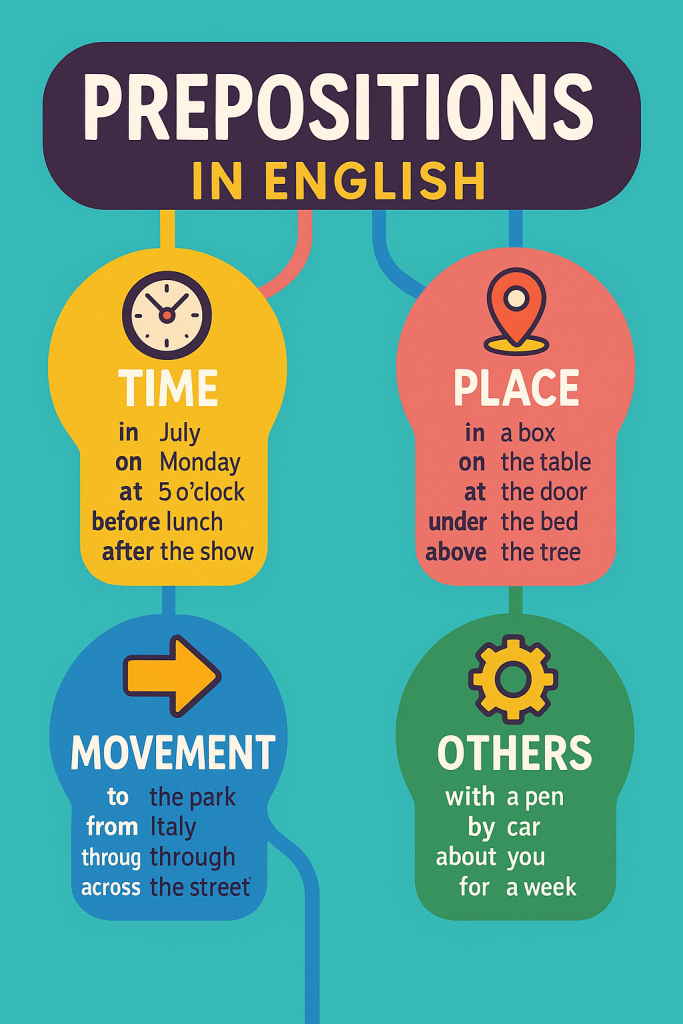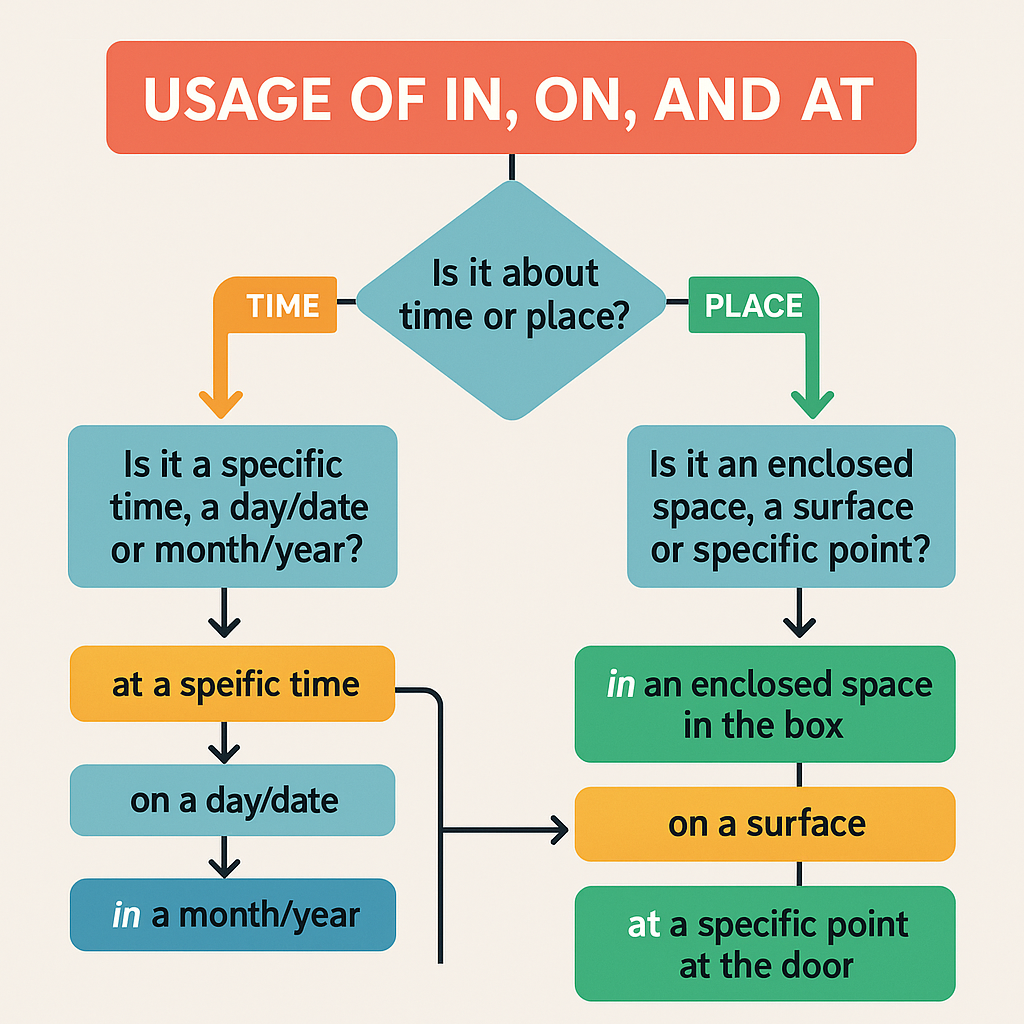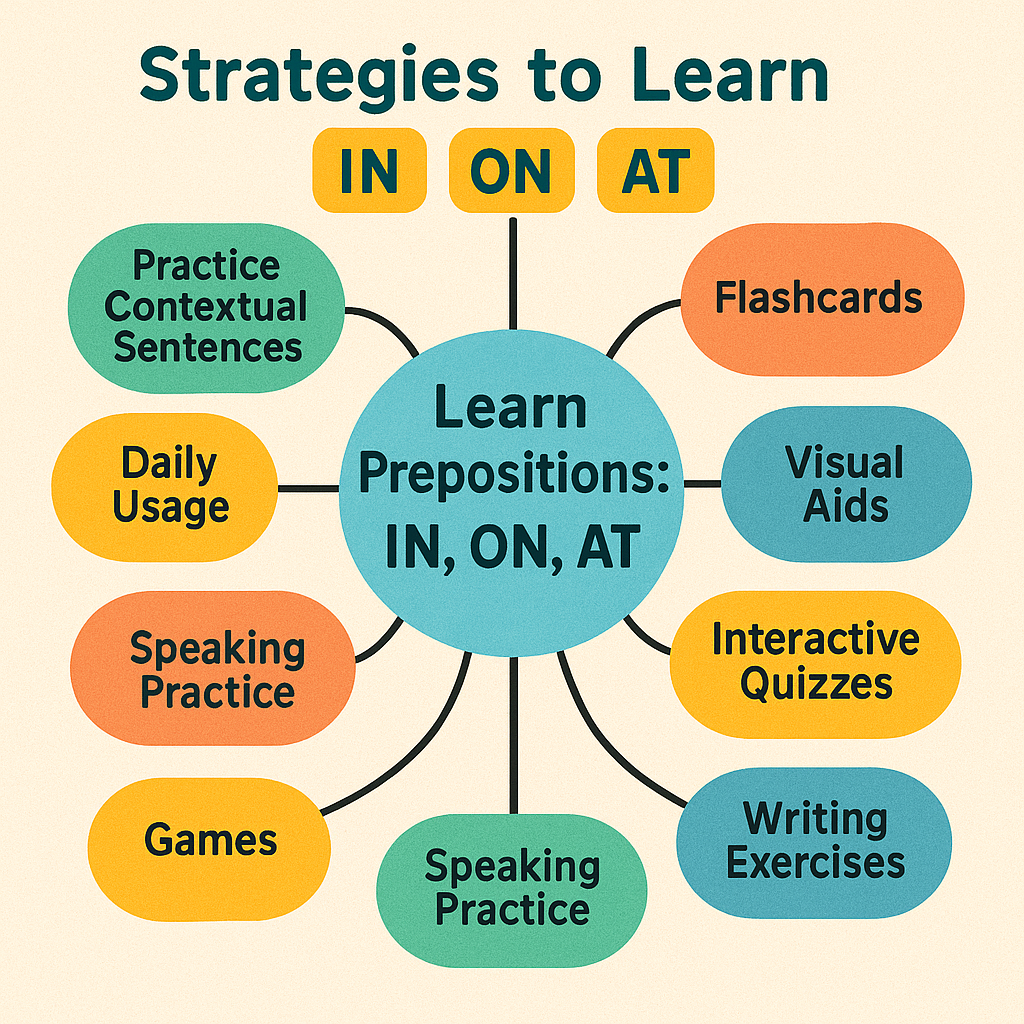
Why Are “In,” “On,” and “At” So Tricky in English Grammar?
If you’ve ever found yourself staring at a sentence wondering if it’s “in the morning,” “on the table,” or “at the station,” congratulations: you’re knee-deep in the chaos of prepositions in English. These tiny words — “in,” “on,” and “at” — might look harmless, but don’t be fooled. They’re the sneaky ninjas of English grammar prepositions, causing havoc in even the simplest conversations.
Whether you’re trying to master in on at for your next big exam or just tired of sounding like a confused tourist, this guide is your ultimate shortcut. We’re diving into the rules, examples, and secret survival tips you need to finally conquer English prepositions without losing your sanity.
Let’s make prepositions fear you for a change. For further official guidance, you can also check Cambridge Dictionary’s prepositions guide.
Understanding the Difference Between “In,” “On,” and “At”

Used for:
- Time: Months, years, centuries, long periods.
- Example: We met in July.
- Place: Enclosed spaces.
- Example: She lives in New York.
- Other Situations: Books, cars, papers.
- Example: The answer is in the book.
Common Confusion: “In the morning” vs. “at night.” Yep, English just likes to keep you on your toes.
If you’re still wrestling with other grammar beasts, you might enjoy Understanding the Simple Subject in Grammar too.
You might also want to see Grammarly’s explanation of time prepositions, because frankly, the English language needs all the help it can get.
When to Use “In,” “On,” or “At” — Rules with Examples
“On”
Used for:
- Time: Specific days and dates.
- Example: We met on Monday.
- Place: Surfaces.
- Example: The phone is on the table.
- Other Situations: Transportation, communication devices.
- Example: She is on the bus.
Common Confusion: “On the weekend” (British English) vs. “at the weekend” (American English loves chaos).
If you’re in the mood for expanding your English even further, check out how idioms breathe life into speech at Underused Regional Idiom
“At”
Used for:
- Time: Specific times and holidays.
- Example: Meet me at 5 PM.
- Place: Specific points.
- Example: He’s at the station.
- Other Situations: Events, locations.
- Example: See you at the party!
Common Confusion: People say “at school” but “in class.” English is basically a group project that never got finalized.
If you want an even more detailed breakdown, British Council’s guide to prepositions might prevent a meltdown.
Quick Guide: Use of Prepositions “In,” “On,” and “At”
Here’s a memory trick — because I know your brain is already full of memes:
- 🧠 In = inside something or a longer time (months, places, etc.)
- 🔲 On = on a surface or a specific date
- 📍 At = specific point in time or space
Want to practice with sentences? Try these:
- I live in Istanbul.
- My keys are on the kitchen table.
- We’ll meet at the restaurant.
Common Mistakes
- Wrong: We met on July.
Right: We met in July. - Wrong: The painting is in the wall.
Right: The painting is on the wall. - Wrong: I’ll see you in the party.
Right: I’ll see you at the party.
Mistakes happen because English is basically a set of rules held together by duct tape and hope.
For deeper dives into parts of speech, don’t miss What Part of Speech is ‘And’? Understanding Parts of Speech.
Practical Tips and Learning Strategies

- Memory Trick:
- In = Inside (months, years, enclosed spaces)
- On = On top (days, surfaces)
- At = A precise point (time, specific places)
- Visualization: Create mental images of “in a box,” “on a table,” and “at a door.”
- Practice with Flashcards: Build a preposition flashcard set with “in,” “on,” “at” examples.
- Interactive Infographic: Check out our visual guide to “In, On, At” to lock it in forever! (Coming soon on our Creative Writing Degrees Guide.)
You can also find handy exercises on BBC Learning English.
Conclusion
Using “in,” “on,” and “at” correctly might feel like trying to win an invisible obstacle race, but with the right tricks (and maybe a little caffeine), you’ll get there. Precise preposition use isn’t just nitpicky grammar; it makes your English sound polished, professional, and clear.

If you’re serious about leveling up, also dive into our guide on Punctuation Rules in English.
FAQ: Prepositions “In,” “On,” and “At” in English Grammar
Q1: What is the difference between “in,” “on,” and “at”?
“In” is for big/general things, “on” is for surfaces and dates, and “at” is for specific points. English prepositions are basically geometry with drama.
Q2: How to use “in,” “on,” and “at” correctly in English grammar?
Use “in” with months and cities, “on” with days and surfaces, “at” with times and specific places. Example: in July, on Tuesday, at 3 PM.
Q3: When do we use “in,” “on,” and “at” in a sentence?
Depends on what you’re talking about — time, place, or situation. There’s no shortcut, but practice helps. And coffee. Lots of coffee.
Q4: What are examples of “on” in English?
- On the floor
- On a bus
- On Monday
- On my phone
Basically anything flat or annoying.
Q5: Why can’t I say “in the bus”?
Because in English, you’re on public transport, but in private vehicles. It’s arbitrary, like fashion trends and cryptocurrency.
